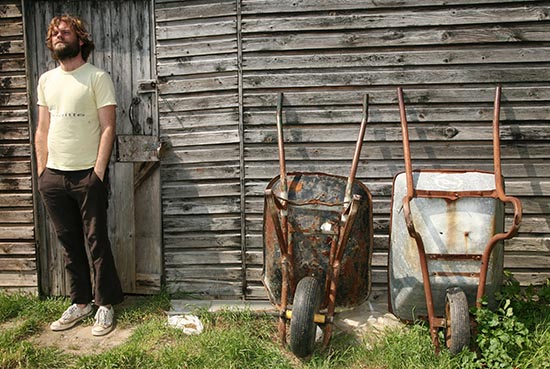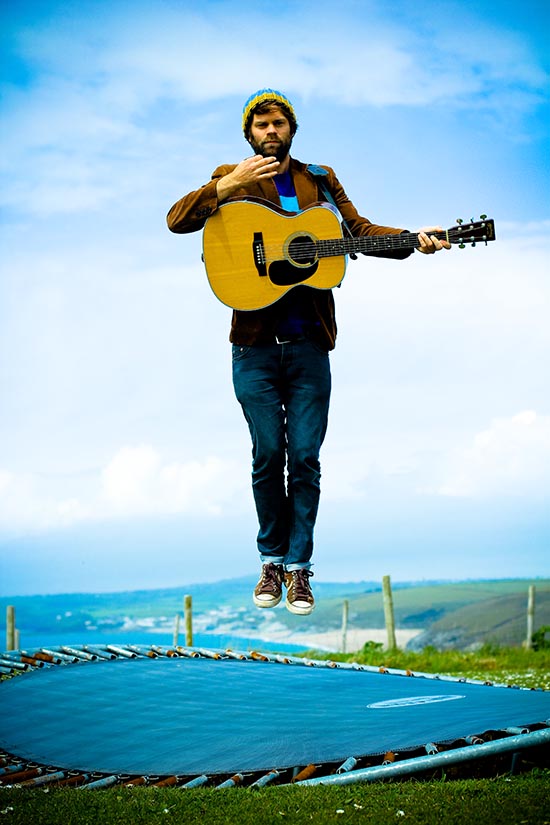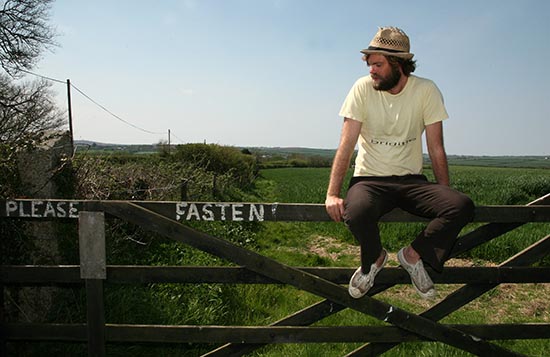If you were able to travel back in time to 1991 and the halcyon daze of shoegaze, baggy and The Scene That Celebrates Itself, it would have been impossible to foresee the meandering path that Neil Halstead would end up traversing. Unlike a contemporary such as Damon Albarn, Halstead is no modern-day Renaissance Man, preferring the simpler, nobler art of song-writing craft over the giddy experimentation the Blur frontman has pursued. So although Halstead, former frontman of the Thames Valley shoegazers Slowdive, is unlikely to be writing an opera in Mandarin any time soon, his career trajectory over the two decades since the release of Slowdive’s debut album is no less interesting.
Despite enduring a vicious kicking from the British press, Halstead worked with Brian Eno, experimented with ambient and minimal techno on the band’s final album, Pygmalion, and then ploughed an engaging alt-country/Americana-inspired furrow with Mojave 3. Now 42, Halstead is enjoying a fruitful though hardly prolific (three albums in ten years) solo recording career. The acclaim is growing for his solo offerings, with Palindrome Hunches his third album, released by the shoegaze revival label Sonic Cathedral.
Halstead’s current incarnation has very little in common with his shoegazing origins and everything to do with the British heritage of folk music. Palindrome Hunches is his finest solo album by a distance. Eschewing the Barrett-esque whimsy of his last outing, Oh! Mighty Engine (released in 2008 on surfer dude Jack Johnson’s Brushfire Records), he has made an exquisite, dark folk record, with his husky, honeyed vocals backed by delicate fingerstyle acoustic guitar (think Bert Jansch) and subtle layers of piano, bass and violin from Wallingford’s Band of Hope.
Nick Drake is the obvious (lazy) comparison, but it’s hard to listen to tracks like ‘Tied To You’, where the violin beguilingly intertwines with Halstead’s intricately picked guitar (in a morose, drop-C tuning that gives it a dark drone) and not think of Drake. It is beautiful, stark and very, very English. There’s an immediate gut and heart connection to the set of songs on Palindrome Hunches.
“I played with [the English folk singer and fiddle player] Jackie Oates,” Halstead explains. “She travels around Cornwall and Devon collecting folk songs. And I listened to her play and felt an instant connection with the melodies. Without us being aware of it, they’re ingrained in our culture.”
I meet up with Halstead in a pub in Shepherd’s Bush prior to his gig at the venerable Bush Hall; the first time he has played the new album to an audience. Amiable, bearded and rocking the itinerant look, Halstead is unassumingly dressed down, sporting a grubby trucker’s cap that gives him the air of somebody you might pick up hitching on one of Britain’s B-roads with a battered acoustic guitar strapped to his back and a few tales to tell.
Image is not high on his list of priorities – music is. Friends who are with him tonight, including the producer of his latest album, Nick Holton, are keen to tell me that Halstead is all about the music and nothing else.
Halstead moved to Cornwall shortly after Slowdive split, choosing Newquay so that he could indulge his love of surfing. The dark heart of the county has informed his music ever since. “You get winters where it feels like there’s two months of just grey. The sea is grey, the rocks are grey, the skies are grey – everything is grey. I feel that on the record.”
Separation from his wife and the mother of his twins is another reason for the prevalent mood of darkness. “There’s a lot of very personal stuff on there that people close to me are uncomfortable with. ‘Spin The Bottle’ is very personal. I find that a hard one to sing. But I think music should be like that – a little bit therapy and a little bit art. All my favourite records have something in them that’s very real, so I’d never consider not singing about what’s going on in my life. My ex-wife has heard it and I know it was very uncomfortable for her, yeah…”

Palindrome Hunches was recorded in the music room of the junior school near Wallingford, Oxford, attended by Holton’s children. It was working with Band of Hope at Holton’s suggestion that saved the album, after it had stalled with Halstead unsure how to proceed. Recorded straight to half-inch tape, most of the songs were done in one or two takes. “With tape, you have to make instant decisions. It’s expensive stuff and we only had four reels. So that gives it a more spontaneous feel. It’s the first time I’ve done [an album] that quickly.”
While no opera in Mandarin, the album’s title track is an ambitious attempt to write a song in palindromes. “I wanted to write a whole song that was the same forwards as backwards – words and music – but I just didn’t have the technical ability. Then after I’d finished the song, a friend of mine played me something by ‘Weird Al’ Jankovic and he’d done a take-off of a Bob Dylan song that was all palindromes. He’d already done it way better than I ever could have.”
For the album’s stand-out track – the stunning mini-opus ‘Wittgenstein’s Arm’ – Halstead, in the grand folk tradition, has taken a story from the past and turned it into a song. It’s the tale of Paul Wittgenstein, the Austrian concert pianist who had his right arm amputated during the First World War and lost three brothers to suicide. “I read the book [The House Of Wittgenstein by Alexander Waugh] and it was fascinating. The First World War ripped the family apart. Paul lost an arm, but became famous because of it. Wagner wrote a piece of music for him. But he became a sideshow and wasn’t really taken seriously. People only said he was any good because he had one arm. It’s like, if he’d had two arms he’d have been half the piano player he was, which is a weird irony.”
It’s an irony not lost on Halstead who, while in possession of two functioning arms, was never really taken seriously as a musician during his time in Slowdive. He and his bandmates were instead judged – and condemned – for their background, having committed the heinous crime of being middle-class. While not a bitter man, the irritation still festers. “Well, we were middle-class, but we went to comprehensive schools – none of us went to public school. My parents didn’t have a lot of money. I left home when I was 16 because I didn’t get on with my dad. There were all these bands like Dinosaur Jr and Sonic Youth, and the class thing didn’t matter because they were American. But it seemed to really matter here and I still don’t really understand why it was such an issue. They said that our parents had bought us our guitars and it simply wasn’t true. We’d contest that in interviews, but they’d never print that part because it didn’t fit in with their agenda. We were like 17, 18 years old and we walked straight into it completely clueless. Creation didn’t really help us in that respect. They were like, we’ll sign you, we’ll get you a manager, we’ll get you a publishing deal, but they didn’t really look after us after that point.”
The band’s relationship with Alan McGee and Creation was a strange one. Considering how hands-on McGee liked to be with his artists, Slowdive were able to keep everything to themselves.
“All our recording sessions were closed. We never gave Creation demos or anything.”
But then Slowdive was never really about songs in the traditional sense. Initially it was all about creating a mood by concocting vast sonic cathedrals [See me after class, Ed] of distorted and treated guitars that completely enveloped Halstead and Rachel Goswell’s dreamy vocals. In early rehearsals the band sounded like the Primitives. Then Christian Savill joined and the Slowdive sound really came together. “He brought the second guitar and was really well versed in My Bloody Valentine – he did a Valentines’ fanzine when he was 14. We advertised for a female guitarist and he wrote back saying that he was willing to wear a dress. With him on board we could do stuff like ‘Avalyn’ that was more instrumental and sprawling. It changed the direction of the band. The songs were always written with for an effected guitar so the sound would always come before the melody. That was the way we always worked.”
After three well-received EPs, the band’s billowing, blissed-out debut album, Just For A Day, was released in 1991. Recorded in a stoned haze, a lot of it was written in the studio as McGee was under the false impression that the band had an album of material ready to record. The reviews were OK but the backlash – and the grunge invasion – was imminent. Next came Souvlaki in 1993, probably the most overtly pop record the band made (produced in part by the ambient maestro Brian Eno and on the receiving end of poor reviews – “Every album we ever did got awful reviews, which was depressing,” recalls Halstead) came 1995’s Pygmalion.
To many (myself included) Pygmalion is Slowdive’s meisterwerk. It was a sparse, cold record, created entirely from samples and loops. It was the first time Halstead had worked with samplers and computers, and there is an odd disconnect when you listen to the album. In the sleevenotes for its re-release in 2005, Ian Watson nailed Pygmalion as “a record of disquiet and silence, of brooding, uncomfortable ambiances and tracks which feel closer to séances than traditional songs… Halstead had busied himself constructing his version of the monolith at the end of 2001: A Space Odyssey. You didn’t so much enjoy Pygmalion as tremble in its presence.” It was also, Watson noted, “essentially (Halstead’s) resignation letter to Creation”, which its creator agrees with. “Pygmalion was a pretty big shock for Creation. I can remember Alan saying to me while we were recording it, ‘It’s got to be a pop record’ and I was thinking, ‘We’ll see Alan’. But that’s the way they were heading. Alan had Oasis by then.”
Rumours circulated that Oasis refused to sign to Creation unless McGee dumped Slowdive (despite ‘Supersonic’ coming out almost a year before Pygmalion), but the writing was on the wall for the band before then. “Pygmalion always felt like the end of something. The band was disintegrating while we were recording it and I don’t think Nick and Christian were into that direction. Simon (Scott, drums) had already left the band because he was aware that live drums weren’t a big part of it.”
Post-Slowdive, Halstead went travelling and the seeds for Mojave 3, the band he formed with fellow Slowdive members Goswell and Ian McCutcheon, were sown. At one point he was in Israel staying in a hostel where he hooked up with a guy who had a guitar. “I told him I was a musician so he gave me the guitar and I realised that I couldn’t really play it properly. Unless I had a bunch of effects pedals I couldn’t do anything. So part of Mojave 3 was me reconnecting with music. I sat down and learnt to play the acoustic guitar properly. I listened to things like the first Leonard Cohen album and realised the power in the lyrics. I was 24 and prior to that I’d just been absorbed by noises. I was a big Bob Dylan fan, a big Neil Young fan. But it never occurred to me that I could make that sort of music. The first Mojave 3 record was a definite effort to make an album that was based around songs.”
Five albums on and Mojave 3 are still a going concern. They played gigs as recently as July, in China where they still have a decent following. “It was the first time we’d played together for a while. For some reason Mojave do really well out there. They’re just so hungry for music.”
Next for Halstead is five-week tour of North America to promote Palindrome Hunches, the only real shame being that Band of Hope can’t join him. Together, they perform a spellbinding set at Bush Hall, playing the new album in its entirety to a reverential audience who haven’t turned up expecting to hear Halstead bust out the effects pedals and play ‘Avalyn’. He does reward anyone with a place for Slowdive in their hearts by performing a gorgeous acoustic version of ‘Alison’, which reveals that there are a few pop gems in the Slowdive catalogue.
But despite his seeming contentment – professionally at least – it must be galling that the music that he made that caused him so much grief in his youth, is now universally lauded. “I genuinely enjoy the fact that our records are still out there and influencing people. That makes me feel good. But I always feel that we missed the boat a bit, because bands like Sigur Rós and Mogwai came along after us and totally cleaned up.”
The positive reappraisal of Slowdive’s music is obviously pleasing, and Halstead isn’t the sort to harbour any resentment, but what about reforming? “I don’t think any of us are totally against the idea. But life gets in the way. Everyone’s doing their own thing. It would take a real concerted effort from all of us for it to happen, and there’d need to be a reason for it other than that we’d get paid a lot of money to do it.”
So what if, no matter what he did between now and shuffling off this mortal coil, Slowdive was to be his epitaph. Wouldn’t that be extremely annoying? As always, Halstead is sanguine.
“Hopefully I’ll be remembered for my best work, and if Slowdive happens to be the best stuff that I was involved with then so be it.”

Palindrome Hunches is out in the UK now on Sonic Cathedral; released worldwide on November 5. Go to neilhalstead.com for tour dates


